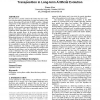Free Online Productivity Tools
i2Speak
i2Symbol
i2OCR
iTex2Img
iWeb2Print
iWeb2Shot
i2Type
iPdf2Split
iPdf2Merge
i2Bopomofo
i2Arabic
i2Style
i2Image
i2PDF
iLatex2Rtf
Sci2ools
142
click to vote
GECCO
2007
Springer
2007
Springer
Hill climbing on discrete HIFF: exploring the role of DNA transposition in long-term artificial evolution
We show how a random mutation hill climber that does multilevel selection utilizes transposition to escape local optima on the discrete Hierarchical-If-And-Only-If (HIFF) problem. Although transposition is often deleterious to an individual, we outline two population models where recently transposed individuals can survive. In these models, transposed individuals survive selection through cooperation with other individuals. In the multipopulation model, individuals were allowed a maturation stage to realize their potential fitness. In the genetic algorithm model, transposition helped maintain genetic diversity even within small populations. However, the results for transposition on the discrete Hierarchical-Exclusive-Or (HXOR) problem were less positive. Unlike HIFF, HXOR does not benefit from random drift. This led us to hypothesize that two conditions necessary for transposition to enhance evolvability are (i) the presence of local optima and (ii) susceptibility to random drift. Thi...
| Added | 07 Jun 2010 |
| Updated | 07 Jun 2010 |
| Type | Conference |
| Year | 2007 |
| Where | GECCO |
| Authors | Susan Khor |
Comments (0)

